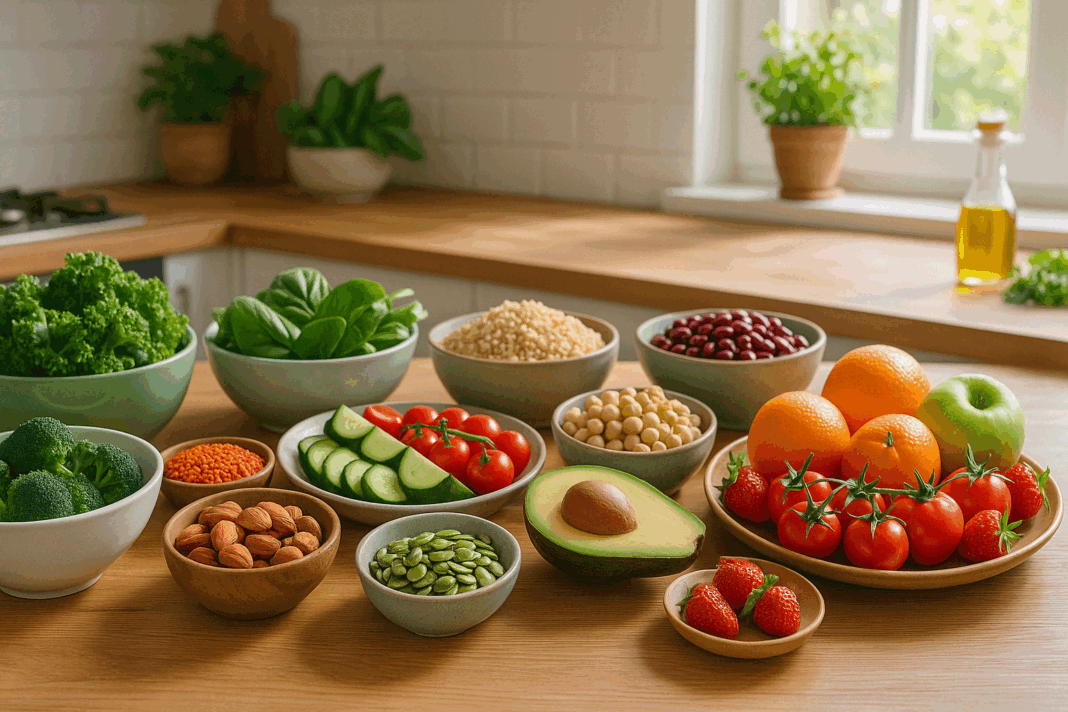Creating a sustainable, science-backed vegetarian diet plan for weight loss isn’t just about eliminating meat. It requires a thoughtful balance of nutrients, whole foods, and lifestyle practices that align with long-term health goals. For those asking, “Will I lose weight by eating vegetarian?” the answer is yes—when done correctly. Plant-based eating can support fat loss and improved metabolic health, but only when rooted in nutrient-dense, calorie-conscious choices.
You may also like: Plant Based Diet vs Standard American Diet: What the Latest Studies Reveal About Long-Term Health Outcomes
Understanding the Science Behind a Vegetarian Diet for Weight Loss
Vegetarian diets have long been associated with lower body mass indexes (BMI), improved cardiovascular health, and a reduced risk of chronic disease. But what makes a vegetarian diet for weight loss effective? The key lies in the focus on fiber-rich vegetables, legumes, whole grains, and healthy fats. These foods naturally support satiety, regulate blood sugar, and reduce overall calorie intake.
Studies consistently show that individuals following a vegetarian weight loss meal plan consume fewer calories on average while achieving better nutrient density. Moreover, shifting to a diet for vegetarians for weight loss often leads to greater awareness of food quality, portion control, and meal preparation—all essential components for losing weight vegetarian-style. High-fiber foods, such as lentils and leafy greens, take longer to digest, keeping hunger at bay and making it easier to stay within a calorie deficit.
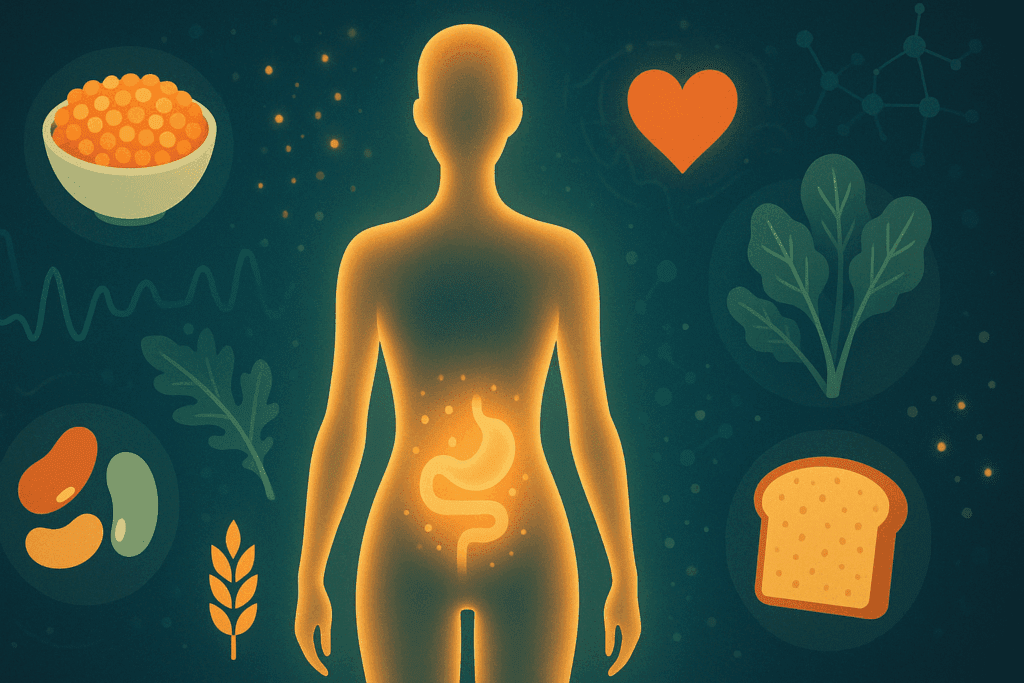
What to Include in a Vegetarian Diet Plan for Fat Loss
For an effective vegetarian weight loss diet menu plan, emphasis should be placed on whole, minimally processed ingredients. Prioritize vegetables, especially non-starchy types like broccoli, spinach, zucchini, and cauliflower. Incorporating plant-based protein sources such as tofu, tempeh, seitan, beans, and lentils is also crucial.
A common misconception is that vegetarians struggle to get enough protein. In reality, combining foods like legumes and whole grains provides all essential amino acids necessary for muscle maintenance and fat metabolism. A fat loss meal plan vegetarian in structure should also include healthy fats—think avocado, nuts, seeds, and olive oil—in moderation. These fats support hormone function and enhance the absorption of fat-soluble vitamins.
Whole grains like quinoa, brown rice, oats, and barley provide sustained energy and fiber to help manage blood sugar levels. While many wonder, “Do vegetarians eat rice?” the answer is a resounding yes—when chosen in whole grain form, rice can be a nutritious part of a vegetarian weight loss program.
The Role of Portion Control and Caloric Awareness
Weight loss ultimately comes down to energy balance. Even with the healthiest ingredients, overconsumption can stall fat loss. For a vegetarian diet plan for weight loss fast, portion control is essential. Using simple tools like food scales, measuring cups, and visual cues can help keep calorie intake aligned with your goals.
Mindful eating practices can also make a major difference. Eating slowly, minimizing distractions during meals, and listening to hunger cues help prevent overeating. A well-structured vegetarian weight loss plan often includes pre-planned meals and snacks to minimize impulse eating and ensure nutritional balance.
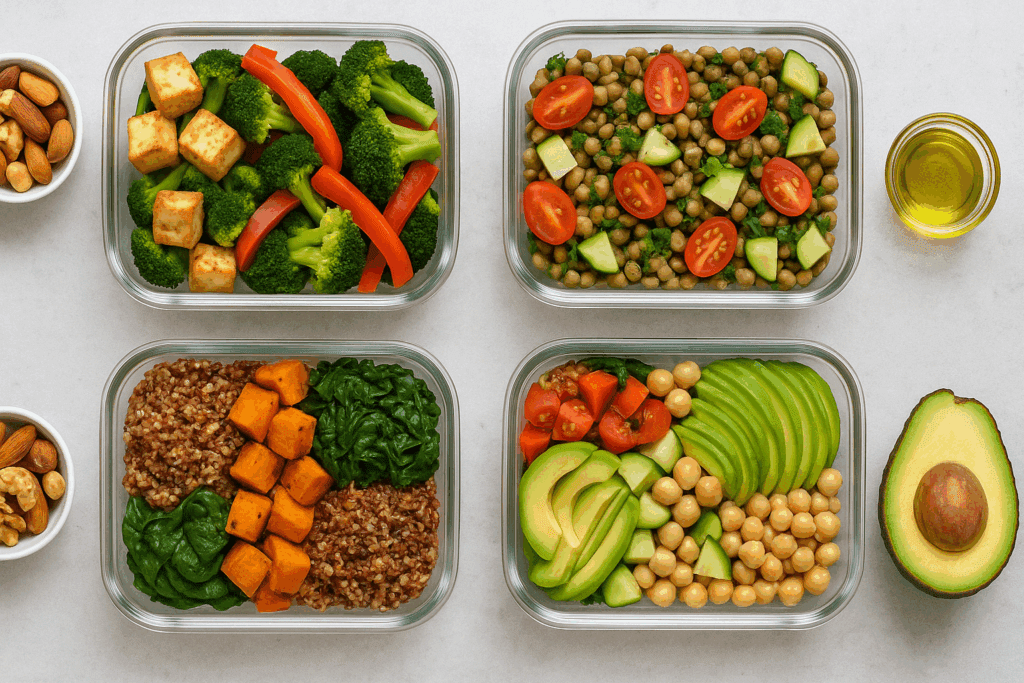
How a Vegetarian Diet Plan for Weight Loss Compares to Keto and Low Carb Diets
The rise in popularity of ketogenic and low-carb diets has sparked debates about the most effective weight loss strategies. Some ask, “Is keto a low carb diet?” or seek to compare the ketogenic diet vs low carb approaches. Others explore the nuanced differences between a low carb diet keto diet and a plant-based fat loss strategy.
Keto and low-carb diets rely heavily on fat and protein while minimizing carbohydrates. While these approaches can promote rapid weight loss, especially in the short term, they often emphasize animal-based foods. For those pursuing plant-based health, a vegetarian weight loss approach provides a sustainable alternative that aligns with long-term wellness.
The question “Is a keto diet sustainable?” often yields mixed answers. While some find success with keto initially, adherence over time can be difficult due to food restrictions and social challenges. On the other hand, a plant-based weight loss plan tends to be more accessible, less restrictive, and supportive of gut health due to its high fiber content.
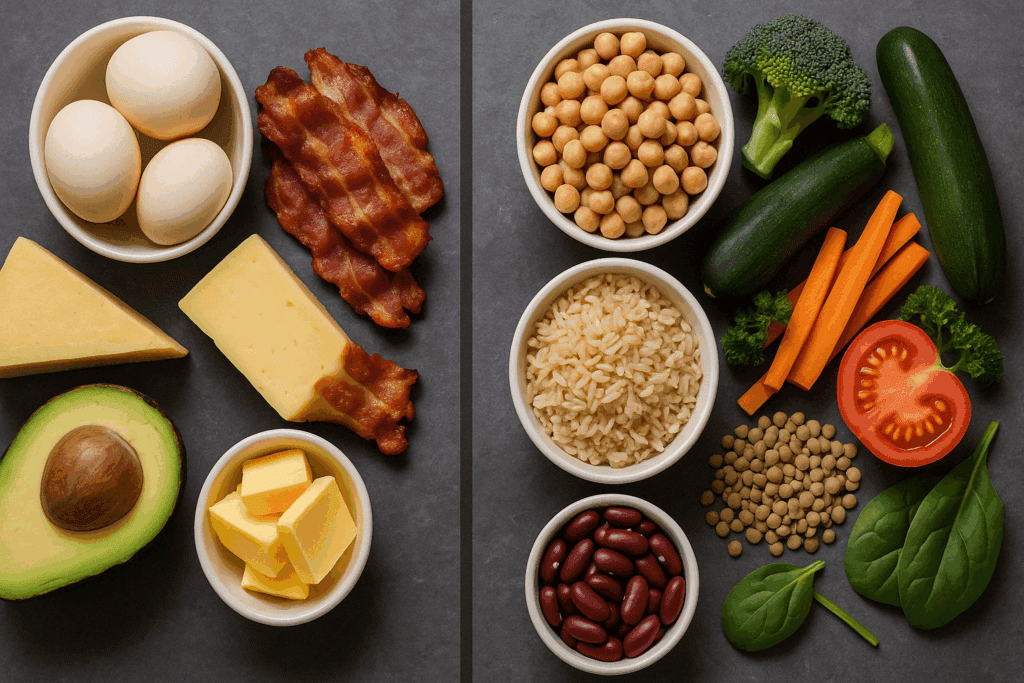
Designing a 7 Day Vegetarian Diet Meal Plan for Weight Loss
Crafting a practical, nourishing, and results-driven 7 day vegetarian diet meal plan begins with variety and balance. Each day should include three main meals and one to two snacks, all built around whole foods.
Breakfast options might include oatmeal with berries and flaxseeds, tofu scramble with vegetables, or whole grain toast topped with avocado. Lunches could feature hearty lentil soups, chickpea salads, or vegetable stir-fries with quinoa. Dinners might rotate between black bean chili, grilled tempeh bowls, or roasted vegetable pasta.
Snacks are best kept simple and nutrient-dense. A handful of almonds, fresh fruit with nut butter, or hummus with raw vegetables are all great choices. These vegetarian meal plans to lose weight ensure consistent energy levels and prevent blood sugar crashes that lead to cravings.
Understanding the Metabolic Benefits of a Meatless Diet for Weight Loss
A meatless diet for weight loss does more than reduce calorie intake. Research suggests that plant-based diets can enhance metabolic function, reduce insulin resistance, and support fat oxidation. This means your body becomes more efficient at using stored fat for energy.
Plant-based diets are naturally anti-inflammatory, which may aid in reducing water retention and bloating. The abundance of antioxidants in fruits, vegetables, and legumes also supports cellular health and recovery—an important factor when incorporating exercise into a vegetarian weight loss plan.
Compared to a low carb diet keto diet that relies heavily on fats, a vegetarian diet supports metabolic flexibility by balancing carbohydrates, proteins, and fats from a broader range of nutrient sources. This not only improves digestion but also supports hormonal balance essential for sustainable fat loss.
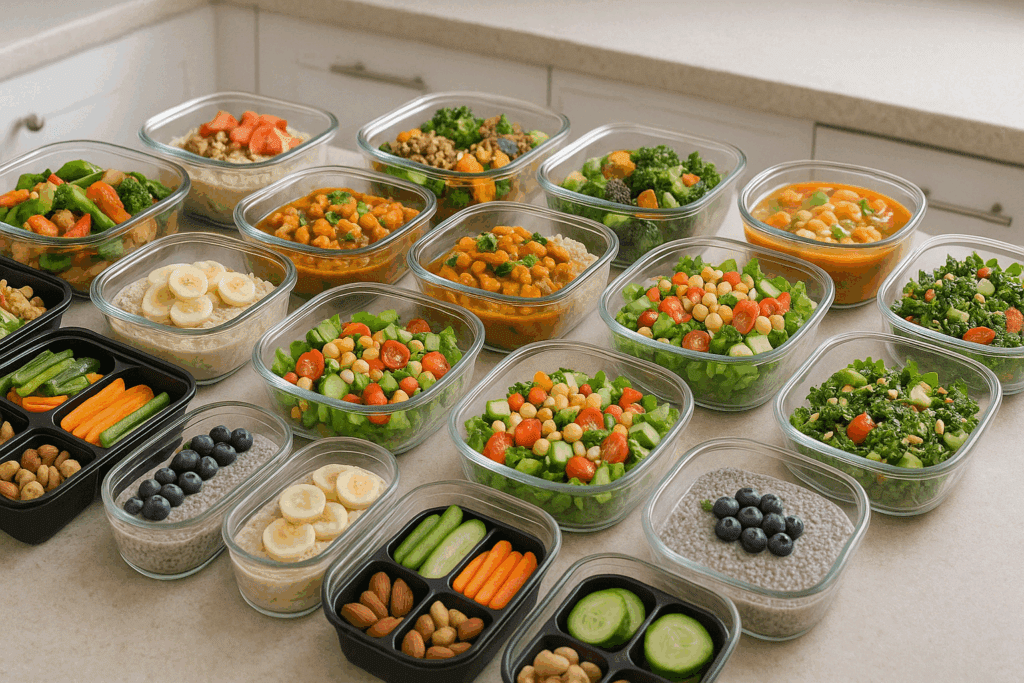
Common Mistakes to Avoid When Following a Vegetarian Weight Loss Plan
One of the most common pitfalls in vegetarian diets to lose weight is relying too heavily on processed meat substitutes. While convenient, these products often contain excess sodium, refined oils, and additives that can hinder weight loss progress.
Another mistake is neglecting protein intake. A vegetarian weight loss diet menu plan must include consistent, varied sources of protein throughout the day. Skipping meals or relying solely on carbohydrates, even healthy ones, can lead to blood sugar spikes and subsequent crashes.
Finally, it’s essential to watch portion sizes of calorie-dense plant foods like nuts, seeds, and oils. While these are nutritious, they are also energy-dense and should be consumed in moderation. Balancing these with high-volume, low-calorie foods such as leafy greens, cruciferous vegetables, and broth-based soups enhances satiety while keeping calories in check.
Can You Lose Weight on a Plant-Based Diet Without Going Low Carb?
A common question arises: can you lose weight on a plant-based diet without reducing carbohydrate intake? The answer is yes. While the keto diet vs low carb diet models rely on cutting carbs, plant-based fat loss strategies emphasize the quality and type of carbohydrates consumed.
Whole-food carbohydrates like sweet potatoes, oats, legumes, and brown rice are nutrient-dense and digest slowly, supporting steady energy and blood sugar control. These foods, central to a vegetarian food plan for weight loss, can actually enhance metabolic rate and fat burning when combined with adequate protein and exercise.
Moreover, fiber-rich plant foods promote satiety and reduce cravings, making it easier to maintain a calorie deficit without constant hunger. This makes vegetarian weight loss plans not only sustainable but also enjoyable and compatible with social and cultural eating practices.
Addressing Common Questions About Vegetarian Diets and Weight Loss
Several questions frequently arise when transitioning to a vegetarian diet. For example, “Do vegetarians eat butter?” and “Can vegetarians eat eggs and milk?” The answers depend on the type of vegetarian diet followed. Lacto-ovo vegetarians do include dairy and eggs, making it easier to meet protein needs and enjoy variety. Vegans, however, avoid all animal products, requiring more strategic planning to achieve nutritional balance.
Other common concerns include whether vegetarians eat rice. As noted earlier, whole grain rice varieties can be part of a healthy vegetarian weight loss diet when portioned appropriately and paired with vegetables and proteins.
The question of whether you will lose weight on a vegetarian diet often depends on food choices, portion control, and overall lifestyle habits. A vegetarian cut, or fat loss phase, works best when paired with consistent physical activity, hydration, and adequate sleep.
How Plant-Based Weight Loss Aligns with Long-Term Health Goals
Unlike fad diets that promise quick results, a vegetarian weight loss program emphasizes long-term sustainability and health. Whole-food plant-based nutrition supports not just fat loss but also improved digestion, better blood pressure regulation, and lower cholesterol levels. The antioxidants and phytonutrients abundant in plant foods help combat oxidative stress, a key factor in aging and chronic disease.
In contrast, questions like “Is keto no carbs?” often reflect misconceptions about diet extremes. While keto minimizes carbs to induce ketosis, this restriction can lead to micronutrient deficiencies over time. When comparing the ketogenic diet vs low carb plant-based diets, the latter wins in diversity, micronutrient density, and gut microbiome support.
Adopting a vegetarian diet plan for fat loss also aligns with environmental sustainability and ethical values, making it a multidimensional lifestyle choice. This holistic approach appeals to those seeking more than just a number on the scale—it’s about overall well-being.
The Importance of Personalization in Vegetarian Weight Loss
Every individual responds differently to dietary changes. What works for one person may not be ideal for another, which is why personalization is key. Factors such as age, sex, activity level, metabolic health, and food preferences should all inform your vegetarian menu plan for weight loss.
Tracking your food intake, energy levels, and physical changes can help identify patterns and make necessary adjustments. Some may thrive on three meals a day, while others benefit from smaller, more frequent eating. The flexibility inherent in vegetarian meal plans to lose weight makes them adaptable to diverse lifestyles and goals.
Working with a registered dietitian or nutrition professional experienced in vegetarian nutrition can provide guidance, ensure nutritional adequacy, and offer accountability—especially during plateaus or challenging phases. This level of expertise enhances the effectiveness and sustainability of your vegetarian diet plan for weight loss.
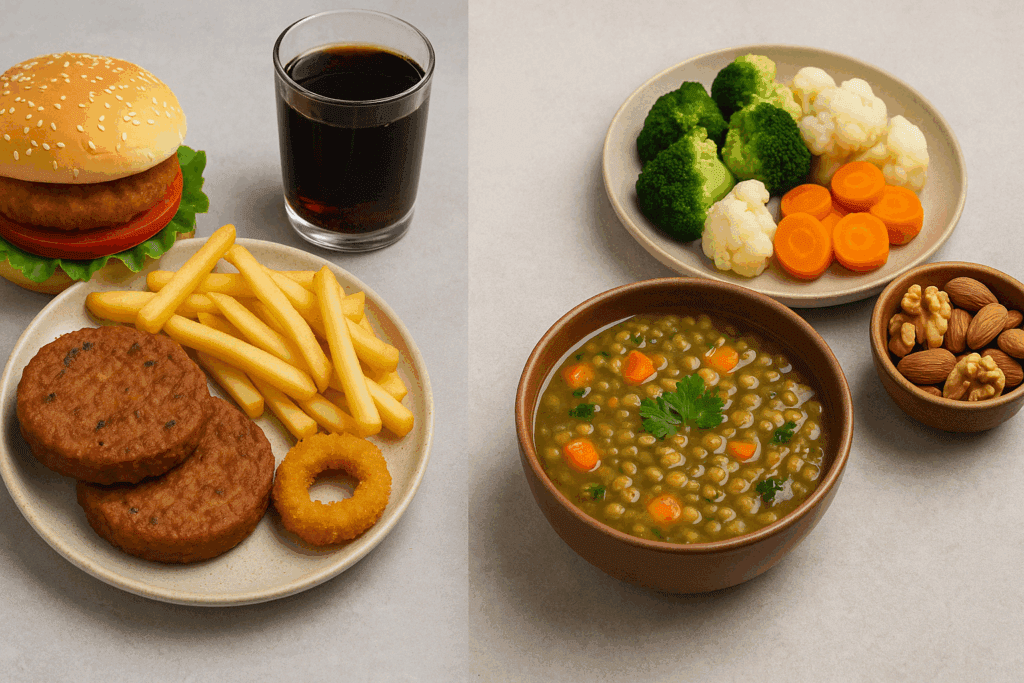
Frequently Asked Questions: Creating an Effective Vegetarian Diet Plan for Weight Loss
1. Can a vegetarian weight loss meal plan support muscle retention during fat loss?
Absolutely. One of the common concerns when adopting a vegetarian diet for weight loss is the potential loss of lean muscle mass. However, muscle can be preserved effectively with a fat loss meal plan vegetarian in design that includes strategic protein sources such as legumes, tofu, tempeh, seitan, and plant-based protein powders. Adding resistance training into your routine enhances muscle retention further. For optimal results, aim for around 1.2 to 2.0 grams of protein per kilogram of body weight per day while following a vegetarian weight loss diet menu plan.
2. What are some common psychological challenges when transitioning to a vegetarian weight loss plan?
Adopting a vegetarian weight loss plan can bring about unexpected emotional challenges, including social pressure, decision fatigue, and cravings tied to nostalgia or routine. Many people face doubt from peers questioning whether you can lose weight on a plant based diet. Combat this by creating a strong support system and preparing mentally for these shifts. Mindfulness practices, journaling your meals and emotions, and setting realistic milestones can keep motivation high and reinforce long-term success.
3. How can a vegan weight loss strategy help reduce visceral fat specifically?
A vegan diet for weight loss emphasizes fiber-dense, anti-inflammatory foods that are particularly effective at targeting visceral fat—the dangerous fat stored around internal organs. Several studies link plant-based fat loss strategies to improvements in insulin sensitivity and reductions in waist circumference. The key lies in consistency and choosing low-glycemic foods like legumes, leafy greens, and whole grains. When maintained over time, a vegan weight loss protocol can lead to lasting reductions in harmful fat without the extreme carb restrictions often found in keto or low-carb diets.
4. What role does meal timing play in a vegetarian diet plan for weight loss fast?
Meal timing can significantly impact the effectiveness of a vegetarian diet plan for weight loss fast. Eating at regular intervals—such as three balanced meals and one or two small snacks per day—helps regulate blood sugar and prevents the energy crashes that often lead to overeating. Some find success using a 12:12 or 14:10 intermittent fasting pattern with their vegetarian weight loss program, though it’s important not to sacrifice nutrient intake. Ultimately, consistency in meal timing often yields better fat loss results than erratic eating habits, especially when paired with a well-designed vegetarian menu plan for weight loss.
5. How do different vegetarian diets compare in their effectiveness for weight loss?
Not all vegetarian diets are created equal. Lacto-ovo vegetarians often find it easier to hit protein targets with eggs and dairy, making their diet for vegetarians for weight loss slightly more straightforward. Vegans, meanwhile, must be more intentional about protein sources but often benefit from lower caloric density and higher fiber intake. Pescatarians—who include fish—may not follow a true vegetarian food plan for weight loss, but sometimes achieve faster results due to increased protein variety. Each type offers unique benefits, but plant-based weight loss success ultimately comes down to quality, quantity, and consistency.
6. Is it possible to experience weight loss plateaus on vegetarian diets to lose weight?
Yes, plateaus can occur even with the best vegetarian diet plan for fat loss. As your body adapts to a calorie deficit, metabolic rates can slow, and progress may stall. When this happens, revisit your vegetarian weight loss meal plan and assess whether caloric intake has crept up or physical activity has decreased. Small tweaks—like rotating new vegetables, switching up protein sources, or increasing fiber—can reignite fat loss. It’s also essential to manage stress and sleep, which both play critical roles in hormonal regulation and losing weight vegetarian-style.
7. How can athletes or active individuals customize a vegetarian weight loss program?
Active individuals require more calories and protein, even during fat loss. A well-rounded vegetarian weight loss program for athletes should prioritize recovery foods such as lentil soups, smoothies with hemp protein, and high-calorie whole foods like oats and nut butters. Timing meals around workouts becomes especially important. A pre-workout snack with carbs and a post-workout meal high in protein are essential components of vegetarian meal plans to lose weight while maintaining energy and performance. Tailoring portion sizes to training intensity ensures that a vegetarian cut doesn’t impair athletic progress.
8. How do cultural and culinary preferences shape a vegetarian weight loss diet menu plan?
A culturally responsive vegetarian weight loss diet menu plan increases the likelihood of long-term adherence. Mediterranean-inspired plans may emphasize olive oil, legumes, and whole grain couscous, while South Asian vegetarian diets often rely on lentils, turmeric, and basmati rice. By anchoring your vegetarian food plan for weight loss in familiar flavors and traditional cooking methods, you can preserve enjoyment while still achieving results. Customizing a veg diet for fat loss to your heritage or personal taste fosters sustainability and honors cultural identity within a health-promoting framework.
9. What strategies help maintain long-term motivation when following a vegetarian weight loss plan?
Maintaining motivation over the long haul requires more than willpower. Visual progress tracking, periodic re-evaluation of goals, and celebrating non-scale victories help sustain momentum. Creating a 7 day vegetarian diet meal plan with rotating recipes prevents boredom and encourages culinary creativity. Joining online communities or local meetups focused on plant based weight loss can provide camaraderie and inspiration. Importantly, aligning your vegetarian diet for fat loss with a deeper purpose—such as environmental impact or ethical values—can offer powerful motivation when results stall.
10. Can you transition from keto to a vegetarian weight loss plan successfully?
Transitioning from keto to a vegetarian diet plan for weight loss is absolutely feasible, though it requires strategic planning. One challenge is reintroducing carbohydrates slowly to avoid water weight gain and energy crashes. Focus on whole-food carbs like sweet potatoes and legumes rather than refined grains. This shift offers the chance to pursue plant based fat loss with more fiber, antioxidants, and long-term sustainability. While some may fear that moving away from keto will slow fat loss, many find that a vegetarian diet for fat loss better aligns with their lifestyle and offers more variety without sacrificing results.

Conclusion: Why a Science-Backed Vegetarian Weight Loss Plan Is a Smart, Sustainable Choice
Choosing a vegetarian diet plan for weight loss is more than a temporary fix—it’s a commitment to a healthier, more vibrant way of life. Grounded in science and guided by whole-food plant-based principles, this approach offers a powerful pathway to fat loss, improved energy, and long-term health. Whether you’re exploring a 7 day vegetarian diet meal plan or developing a customized vegetarian weight loss program, the key lies in balance, variety, and consistency.
In contrast to the often restrictive nature of low carb diet keto diet models, plant-based eating provides flexibility and enjoyment without compromising results. For those wondering, “Can you lose weight on plant based diet plans?” the evidence says yes—and with fewer risks and more benefits. While the ketogenic diet vs low carb models can serve specific purposes, many find that a plant-based fat loss strategy better suits their physical, emotional, and ethical needs.
Ultimately, the most effective diet is one you can maintain. With careful planning, nutrient-dense ingredients, and a focus on long-term wellness, a vegetarian weight loss diet menu plan can help you achieve and maintain your health goals for years to come.
Was this article helpful? Don’t let it stop with you. Share it right now with someone who needs to see it—whether it’s a friend, a colleague, or your whole network. And if staying ahead on this topic matters to you, subscribe to this publication for the most up-to-date information. You’ll get the latest insights delivered straight to you—no searching, no missing out.
Further Reading:
How to Lose Weight on a Vegetarian Diet
Vegetarian diet: How to get the best nutrition
A template of 7-Day Indian Vegetarian Diet Plan for Weight Loss
Disclaimer
The information contained in this article is provided for general informational purposes only and is not intended to serve as medical, legal, or professional advice. While NewsHealthWatch strives to present accurate, up-to-date, and reliable content, no warranty or guarantee, expressed or implied, is made regarding the completeness, accuracy, or adequacy of the information provided. Readers are strongly advised to seek the guidance of a qualified healthcare provider or other relevant professionals before acting on any information contained in this article. NewsHealthWatch, its authors, editors, and contributors expressly disclaim any liability for any damages, losses, or consequences arising directly or indirectly from the use, interpretation, or reliance on any information presented herein. The views and opinions expressed in this article are those of the author(s) and do not necessarily reflect the official policies or positions of NewsHealthWatch.

